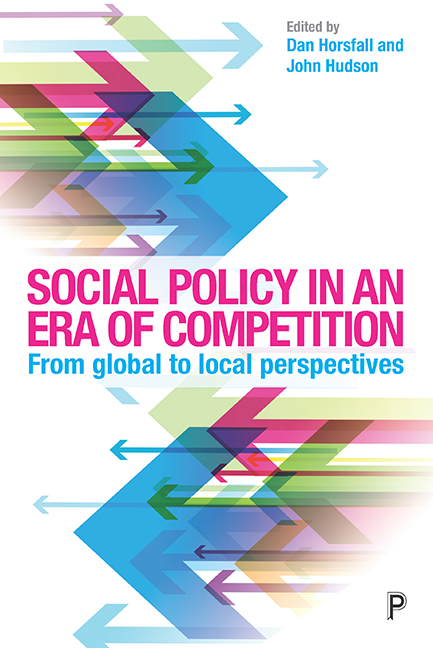Book contents
- Frontmatter
- Contents
- List of figures, tables and boxes
- List of contributors
- List of abbreviations
- Introduction: social policy in an era of competition
- Part One Global competition as the context for welfare
- Part Two The impact of intensifed competition on local governance
- Part Three The reframing of welfare discourses in an era of competition
- Part Four Conclusions
- References
- Index
ten - Convergence of government ideology in an era of global competition: an empirical analysis using comparative manifesto data
Published online by Cambridge University Press: 05 April 2022
- Frontmatter
- Contents
- List of figures, tables and boxes
- List of contributors
- List of abbreviations
- Introduction: social policy in an era of competition
- Part One Global competition as the context for welfare
- Part Two The impact of intensifed competition on local governance
- Part Three The reframing of welfare discourses in an era of competition
- Part Four Conclusions
- References
- Index
Summary
Introduction
One of the tenets of the competition state and globalisation efficiency theses has been that the end of Keynesian demand-led policies triggered a convergence of partisan and government policy positions in regard to the market economy, government efficiency and the welfare state. For instance, Cerny (1997; 1999, p 3) saw ‘the recasting of party ideology’ – which they understand as ‘accepting the imperatives of international competitiveness and consumer choice as having a higher ideological status than domestic social solidarity’ – as a key dimension of the competition state. This key dimension of competition ‘stateness’ has, however, proved extremely difficult to operationalise. For instance, Horsfall (2010, pp 59–60; see also: Horsfall, 2013a), in the most serious attempt to empirically test the competition state thesis to date, bemoans the complexity of quantifying government ideological shifts and cautions against simplistic dichotomous, unsystematic, naive or subjective attempts to capture convergence of partisan and government ideology in an era of global competition. As a result, Horsfall (2010; 2013a,b) refrains from including any such indicator in his analysis altogether.
The focus in the competition state literature on political agency mirrors a long-lasting debate on the effect of partisan difference in the comparative welfare state research. Here, the dominant question has become whether ‘party ideology actually matters’ for the policies and politics of the welfare state (see Häusermann et al, 2013 for a comprehensive summary). Indeed, a number of important quantitatively informed applications have failed to find any partisan effects (for example Huber and Stephens, 2001; Allan and Scruggs, 2004), while the ‘new politics’ thesis of the welfare state – primarily drawing on comparative historical evidence – forcefully contends that partisan difference has ceased to matter for welfare state change post- 1980 (Pierson, 1996; but see also Giger and Nelson, 2011; Bonoli and Natali, 2012 for more recent appraisals). Here, analysts have increasingly made use of data published by the Manifesto Research Group/Comparative Manifesto Project (MRG/CMP/MARPOR) (Budge et al, 2001; Klingemann et al, 2006) to better capture the ideological positions of parties, electors and governments. This project has been in operation since 1979, coding literally thousands of party manifestos issued by hundreds of parties in 57 countries roughly covering the period from 1950 to 2015 (see Volkens et al, 2014).
- Type
- Chapter
- Information
- Social Policy in an Era of CompetitionFrom Global to Local Perspectives, pp. 165 - 186Publisher: Bristol University PressPrint publication year: 2017



